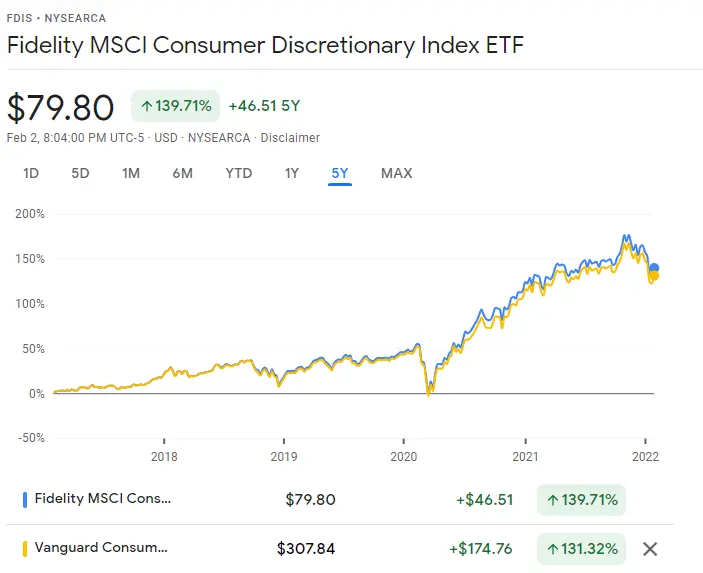There are several Consumer Discretionary ETFs available for investors to choose from, and it can be challenging to decide which is the best.
Two of the most popular options are the Fidelity Consumer Discretionary ETF (FDIS) and the Vanguard Consumer Discretionary ETF (VCR).
In this comparison, we’ll be reviewing their investing strategy, expense ratio, dividend distribution, and overall performance.
FDIS vs VCR: Fund Objective
The Fidelity Consumer Discretionary Index ETF (FDIS) is a passively managed exchange-traded fund that seeks to provide investment results that correspond to the price and yield performance of the MSCI USA IMI Consumer Discretionary Index.
The Vanguard Consumer Discretionary ETF (VCR) invests in stocks of companies that are considered to be part of the discretionary spending sector. This includes companies in the media, retail, gaming, and travel sectors. The fund has a market cap of $7.43 billion.
FDIS vs VCR: Expense Ratio
The expense ratio of FDIS is 0.08%, while the expense ratio of VCR is 0.10%.
Fidelity Consumer Discretionary ETF has a relatively low expense ratio, and is lower than the average expense ratio of similar funds. This makes FDIS a cost-effective way to invest in the consumer discretionary sector.
FDIS vs VCR: Top 10 Holdings
Since both ETFs track a similar benchmark, their top holdings are nearly identical. The weight of each stock in the portfolio may differ.
FDIS Top 10 Holdings
| COMPANY | SYMBOL | TOTAL NET ASSETS |
|---|---|---|
| Amazon Inc. | AMZN | 21.01% |
| Tesla Inc. | TSLA | 13.69% |
| Home Depot Inc. | HD | 7.10% |
| Nike Inc. Cl B | NKE | 3.48% |
| McDonald’s Corp. | MCD | 3.28% |
| Lowe’s Cos. | LOW | 2.94% |
| Starbucks Corp. | SBUX | 2.28% |
| Target Corp. | TGT | 1.87% |
| Booking Holdings Inc. | BKNG | 1.64% |
| TJX Cos. | TJX | 1.53% |
VCR Top 10 Holdings
| COMPANY | SYMBOL | TOTAL NET ASSETS |
|---|---|---|
| Amazon Inc. | AMZN | 21.14% |
| Tesla Inc. | TSLA | 13.86% |
| Home Depot Inc. | HD | 7.20% |
| Nike Inc. Cl B | NKE | 3.51% |
| McDonald’s Corp. | MCD | 3.35% |
| Lowe’s Cos. | LOW | 3.00% |
| Starbucks Corp. | SBUX | 2.32% |
| Target Corp. | TGT | 1.92% |
| Booking Holdings Inc. | BKNG | 1.67% |
| TJX Cos. | TJX | 1.55% |
As of 12/31/2021
FDIS vs VCR: Dividend Yield
The dividend yield of Fidelity Consumer Discretionary Index ETF (FDIS) is 0.64% . The fund pays dividends on a quarterly basis.
The dividend yield of Vanguard Consumer Discretionary ETF (VCR) is 0.88%. Similar to FDIS, VCR also distributes dividends quarterly.
FDIS vs VCR: Annual Return
| Funds | Fidelity® MSCI Consumer Discretionary Index ETF | Vanguard Consumer Discretionary Index Fund ETF Shares |
|---|---|---|
| 1 month | +0.14% | +0.08% |
| 3 months | +10.27% | +10.23% |
| 6 months | +9.34% | +9.29% |
| 1 year | +24.34% | +24.88% |
| 3 years | +33.29% | +33.16% |
| 5 years | +23.61% | +23.17% |
Considering the similarities between these two ETFs, it’s no wonder that even their performances over the past five years are nearly identical.

Which is Better, FDIS or VCR?
Here are the differences between FDIS and VCR:
- FDIS is slightly cheaper than VCR regarding expense ratio, 0.08% and 0.10%, respectively.
- VCR has over 7 billion in assets under management, whereas FDIS only has a little over 2 billion in assets.
We conclude that the difference between these two funds are minimal. As a result, you don’t need to hold both ETFs in your portfolio. Just one pick.
I’d go with Vanguard Consumer Discretionary Index Fund (VCR) since it has been around longer and has a bigger net asset value. But overall, you can’t go wrong with either.
Community Reviews:
David O:
Solid market returns. Not great distributions but exposure to a lot of top notch companies. I own it and FTEC.
Collin G:
If you like Consumer Cyclical sector ETF and like to own Amazon, Nike, Lowe’s, Home Depot, McDonald’s, FDIS is a good one.
Robert A:
I like the idea of customer staples here; I’m overweight in a good number of the individual stocks in this fund including two of the top holdings; MO and PM.
Madiha K:
I have FDIS and XLF. With ETFs, you can trade throughout the day. I also have FSRPX with a fund manager.
I prefer mutual funds because I can set them up on my automatic investment plan (bi-monthly).
1 post – 1 participant
